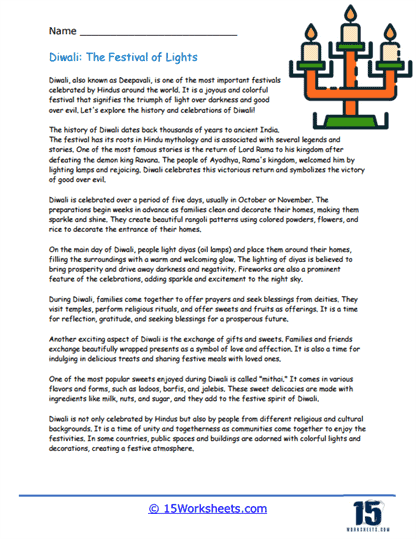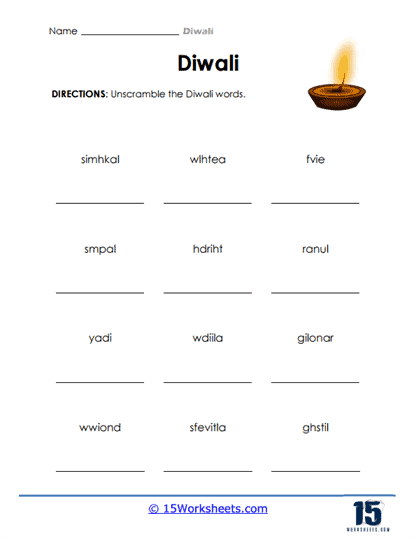Diwali Worksheets
All About These 15 Worksheets
The collection of Diwali worksheets serves a dual purpose: to teach students about the cultural and religious significance of Diwali while simultaneously reinforcing essential academic skills. Each activity is thoughtfully designed to blend cultural learning with key educational objectives, making the learning process engaging and informative.
The worksheets begin by offering students a clear and concise explanation of Diwali, including its significance and the cultural practices associated with it. This foundational information encourages students to enhance their reading comprehension skills. By engaging with these texts, they are challenged to gather and process information, build an understanding of Diwali’s historical context, and connect it to broader cultural celebrations. This deepens their ability to read for understanding while exploring the traditions of an important global festival.
Vocabulary building is another focal point of the worksheets, as they introduce key Diwali-related terms like “Diya,” “Lakshmi,” and “Rangoli.” Through activities that include associating words with images, syllable counting, and fill-in-the-blank exercises, students are encouraged to not only recognize but also fully understand these new words. This focus on vocabulary expands their word knowledge and reinforces sight word recognition, particularly in the context of a cultural celebration. By connecting language learning with cultural elements, students’ language acquisition is both meaningful and memorable.
Some worksheets delve into phonological awareness by asking students to count syllables in Diwali-related words. This promotes an understanding of word structure, allowing students to break down complex words into simpler sound units. Such activities not only help improve their decoding abilities but also fine-tune their listening skills, which are critical components of early literacy development.
Several activities in the collection engage students in critical thinking. Through tasks like identifying true or false statements, unscrambling words, or answering comprehension questions about Diwali, students are required to process and apply the information they’ve learned. These exercises challenge students to think beyond rote memorization and encourage them to engage in more complex cognitive tasks, such as verifying facts and making connections between concepts.
Writing and reflection are also emphasized in the worksheets, allowing students to express their thoughts and connect the lesson to their own lives. Prompts such as “How will you celebrate Diwali this year?” encourage students to reflect on the material while practicing writing complete sentences. This not only enhances their writing skills but also fosters a personal connection to the cultural material, making the learning experience more relevant and engaging.
In addition to the academic skills, these worksheets introduce students to Diwali as a multicultural celebration observed by various faiths, including Hindus, Sikhs, Jains, and Buddhists. This promotes cultural awareness and inclusivity, helping students appreciate the global significance of the festival. The acknowledgment of Diwali’s widespread celebration fosters an appreciation for diversity, encouraging students to learn about and respect traditions from various cultures.
Several activities explore the deeper symbolic meanings of Diwali, such as the victory of light over darkness, good over evil, and knowledge over ignorance. These exercises prompt students to reflect on the values underlying the festival, encouraging them to draw parallels between cultural practices and universal themes. This allows students to connect the lessons of Diwali to broader life values, adding depth to their understanding.
Word puzzles and other activities, such as unscrambling words and fill-in-the-blanks, support problem-solving and word recognition skills. These types of exercises challenge students to think creatively while reinforcing language acquisition in a playful, engaging manner. Word games like these keep the learning light and fun, while still promoting important cognitive skills.
What is Diwali?
Diwali, also known as Deepavali, is one of the most significant festivals in Indian culture. It’s a Hindu festival, but also celebrated by Jains, Sikhs, and some Buddhists. Known as the “Festival of Lights,” it symbolizes the spiritual “victory of light over darkness, good over evil, and knowledge over ignorance.”
Diwali is a five-day festival that usually takes place between mid-October and mid-November, depending on the lunar calendar. Each day of Diwali has its own associated traditions, but the festival is most famous for the millions of lights— in the form of oil lamps, candles, and fireworks— that are lit on the night of the new moon to create a spectacular display.
The specific narratives and traditions associated with Diwali can vary greatly depending on regional and cultural differences. Some celebrate it in honor of the return of Lord Rama, his wife Sita and his brother Lakshmana from exile, as told in the Hindu epic Ramayana. Others associate it with the goddess of wealth and prosperity, Lakshmi.
Traditions often include cleaning and decorating homes, lighting lamps and candles inside and outside of homes, exchanging gifts, feasting on sweets and snacks, and gathering with family and community members. It’s a time for renewal and rejoicing.
Where is it Celebrated?
India – As the country with the largest Hindu population, Diwali is widely celebrated across all regions of India, although customs and traditions can vary significantly between different areas.
Nepal – Known as Tihar or Swanti, it is a significant festival in Nepal and shares many similarities with Diwali celebrations in India.
Sri Lanka – This country has a significant Hindu Tamil population who celebrate Diwali.
Malaysia – Diwali is a public holiday in Malaysia and is celebrated by the country’s significant Indian population.
Singapore – Diwali is a public holiday in Singapore, which has a sizeable Indian-origin population.
Fiji – With a significant Indo-Fijian population, Diwali is an important festival and a public holiday in Fiji.
Mauritius – With a majority Hindu population, Diwali is a major festival in Mauritius.
Guyana, Trinidad and Tobago, Suriname – These countries have significant populations of Indo-Caribbean people, and Diwali is a public holiday there.
Pakistan and Bangladesh – While these countries are predominantly Muslim, their Hindu and Sikh minorities do observe Diwali.
In recent years, Diwali has been celebrated in an increasing number of locations around the world, and it has gained a significant presence in multicultural celebrations in countries with large Indian diaspora populations such as the United States, the United Kingdom, Australia, and Canada.
















